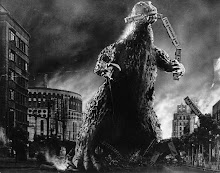
Menilmontant - 1926
Director: Dimitri Kirsanoff
Writer: Dimitri Kirsanoff
Players: Nadia Sibirskaia, Yolande Beaulieu, Guy Belmont
[http://www.imdb.com/title/tt0147039/]
The Gist:
This is a French Impressionistic film, which means a few different things. It's not your bourgeoisie Americanized trite sentimentalized schmaltz posing as "cine pur" or pure cinema. No this is something "real", something stark and moody and without such tired conventions like plot. And the suffering, let us not forget the suffering. After all, any moment on film not suffering is a moment wasted. No this film says "We are French, we suffer, we anguish. Look at how pretty we can make all our suffering and anguish. Aren't we hip? Don't you want to go off and hang yourself in some tragically bohemian fashion after watching our dreary little production. Yes? Wonderful."
Why It's Kind of Cool:
I make fun of it, but this is actually a badass little film. For one thing, it rivals Eisenstein in terms of cinematography (though not for Eisenstein's epic stagings). For another, as far as silent film goes, this is some of the better acting I've seen. A large part of the impressionistic movement is for the actors to provide realism in their performances (instead of the exaggeration permeating the craft at the time). These performances (along with authentic locations, et al) are supposed to convey impressions of emotions and mental states. Though there are theatrical moments (such as eyes widening, overemphasizing her shock), the tender moments in this film are bar none to its contemporaries. Also I kind of have a crush on the Nadia girl. I know she's dead and buried at this point, but I wanted to step into the film and usher her and her illegitimate child away from the cold and gloomy streets of Menilmontant and console her about her murdered parents and her lost sister who is now gallivanting around town with the father of her child. Yes, that's the story. And it's much better watching it than talking about it in retrospect and seeing how ridiculous it is.
Why it Could Be Better:
Despite its lofty ambitions to rise above the early set cliches of the medium, it still falls into the pitfalls of mawkishness now and then. This seems inevitable for silent film because there needs to be extreme story elements and emotions in order to convey itself successfully without the aid of sound. However, for a film that is part of a movement stating its purpose to move away from that kind of filmmaking, it makes it particularly odd when we see the filmmaker revert back to it. Another thing is the lack of form in the narrative structure. This is an element of the avant garde French cinema at the time but it fits better with surrealism than this. However, this is a minor complaint because the film is a scant 36 minutes long which feels close to perfect. This causes the annoyance of a lack of form to be minimal at best.

No comments:
Post a Comment